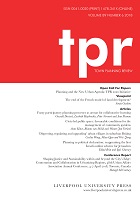
Effects of Urban Renewal on Non-subsidised Property Owners: Evidence from East Germany
Urban renewal programmes intervene in the housing market by offering different kinds of subsidies that support the improvement of public spaces or selective demolition. The central aim of this paper is to disentangle the economic impact of these subsidies on property owners and investors by exploring the value of residential real estate. There is limited knowledge as to which type of owners benefit from such actions and whether they even benefit at all. One may expect that the indirect effects of a regime of regulation inspire more confidence in market recovery from the perspective of property owners. By using the theory of real options it is assumed that urban renewal raises the option premium of a property which in turn represents an opportunity to the owners to use and develop their property. This opportunity is based on expectations of higher revenues in the future. The hypothesis of an increasing option premium is explored using data from a large urban renewal programme in East Germany.




